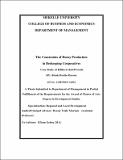| dc.description.abstract | Beekeeping is a traditionally well-established household activity in almost all parts of Ethiopia. However, the benefit from the sub sector is not satisfactory compared to the existing potential. The objective of this study is conducted to identify the constraints of honey production in beekeeping cooperatives in Tigray Region, Killite Awlalo Woreda. Specifically, the study examined the social, environmental, and administrative constraints of these BKCs. The research design was survey type which incorporates 160 participants including 80 members and 80 nonmembers. Data collected for this study was processed using SPSS software and analyzed using descriptive statistics. As a result the Beekeeping cooperatives internal constraints which were identified by this study includes; lack of transparency, poor members participation controlling mechanism, limited capacity of BoD and lack of working capital. In addition, the study identified those constraints such as; honey bee pest attack, drought problems, distant location of apiary sites and increased price of beekeeping inputs as an external problems. Even if the BCKs do have a great potential to increase the honey productivity, due to the existence of these constraints, they didn’t bring significant progress yet in the study area. To minimize the impact of their internal constraints, BKCs are expected to enhance transparency and accountability. In addition BKCs are expected to strengthen their members’ equivalent participation together with its controlling mechanism to enhance the number of members which actually contributes for the increased honey productivity. As lack of working capital is also one of the problems of BKCs, they are expected to effectively mobilize members for additional share capital contribution. Due to distant location of apiary sites of BKCS at distant closure areas, their beehives are easily exposed for honey bee pests attack. Therefore, the day to day bee colony management work is expected from members to prevent the honey product decreased due to pest attack. Finally, to develop better bargaining power in the market, BKCs are expected to jointly collect, process and pack their better quality honey product. If integrated corrective actions are taken on these identified constraints of BKCs by members and stake holders, BKCs will play significant role on honey production and productivity in the study area. | en_GB |


